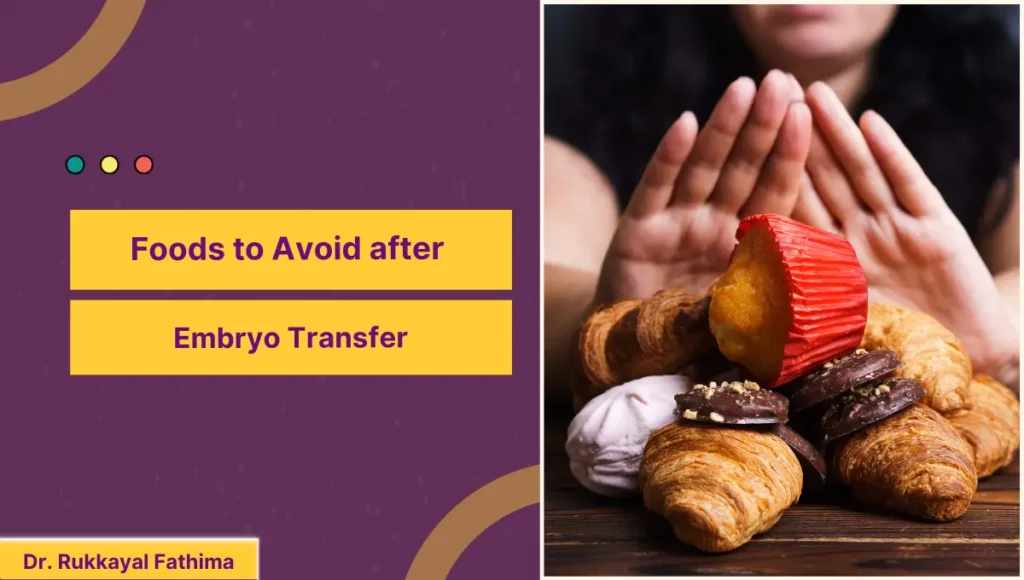IVF (Invitro Fertilization) is one of the fertility treatments that most couples prefer when they cannot get pregnant naturally. In the procedure, the eggs and sperm are collected from the couple, fertilized in a laboratory, and transferred into the uterus to result in pregnancy.
Embryo transfer is the last stage of the IVF procedure, where the developed embryo is transferred into the female partner’s uterus. Pregnancy happens when the embryo successfully implants into the uterine lining.
The time after the embryo transfer is very important because it determines whether the embryo implants into the uterus. Any small misstep can affect the result.
So, you need to be extra careful about the foods you take after embryo transfer. In this article, let’s discuss the foods you should avoid after an embryo transfer. Simultaneously, let’s discuss some foods that can be a healthy addition to your post-embryo transfer diet.
Type of Foods to avoid after embryo transfer
As you know, the foods you take after embryo transfer can affect the result of your IVF cycle. Here are some foods that are unhealthy for your body and can affect the IVF results. Ensure to stay away from them after your embryo transfer.
Processed Foods
Processed foods are high in unhealthy fats, sugar, and sodium. This can lead to inflammation and affect your reproductive health. Processed foods are also a major cause of metabolic diseases like type 2 diabetes. This can reduce your chances of successful implantation and pregnancy.
Caffeine
It is best to limit the amount of caffeine you consume after embryo transfer. Too much caffeine can negatively affect your chances of implantation. Even if you don’t want to avoid caffeine entirely, you should at least limit the amount of caffeine intake per day for good results.
Junk foods
Junk foods are high in cholesterol, fat, salt, and sugar levels. They also lack essential nutrients like vitamins, minerals, and fiber. You should definitely avoid junk foods after an embryo transfer for a higher implantation rate and a healthy pregnancy.
Soft drinks
Soft drinks such as sodas are high in unhealthy sugar and calories. They have no nutritional benefits and will only lead to weight gain and insulin resistance. This can highly hinder your chances of a successful pregnancy. Try to avoid these unhealthy soft drinks and go for healthy alternatives like water, fruit juices, etc.
Alcohol and cigarettes
Alcohol and cigarettes are a big “no” if you are trying to get pregnant. Excessive cigarette and alcohol consumption has been linked to decreased implantation rates and decreased chances of pregnancy.
Doctors usually recommend couples undergoing IVF to quit smoking and alcohol at least 3 months before starting the IVF procedure.
Do not skip your meal
Skipping meals can affect your body’s natural metabolic processes and lead to hormonal imbalances. A healthy, well-balanced diet is essential to implant the embryos successfully.
Do not skip your meals, and maintain a regular eating pattern after embryo transfer. You can also follow this pattern once pregnancy is confirmed.
It is important not to skip any meals. Likewise, it is important to not eat too much during this period. Avoid overeating and indulging in unhealthy foods to satisfy your pregnancy cravings.
Conclusion
The time after embryo transfer is the most crucial period of your IVF cycle. It is the period you should know what you can and cannot do and follow a healthy lifestyle.
Try eating healthy, nutritious foods and try avoiding the unhealthy foods we discussed above. You can also consult your IVF doctor or a dietician and get a diet plan for a healthy and successful IVF pregnancy.
Though fruits are generally safe to eat during pregnancy, some fruits must be avoided during pregnancy. Some of these fruits are
- Pineapples,
- Papayas,
- Grapes,
- Mangoes,
- Dates, etc.
You need to get as much protein as you can during pregnancy. Proteins are the building blocks of the body. So, you should eat protein-rich foods for your and your baby’s healthy growth.
Protein-rich foods like fish, beans, legumes, nuts, cheese, and sprouts are some of the best foods to eat during pregnancy.
Coconut water’s antidiuretic properties aid in the prevention of urinary tract infections during IVF. Coconut water is a natural diuretic drink since it contains potassium, magnesium, phosphorus, and other minerals. It also appears to aid in the removal of kidney stones.
Yes, you can travel after embryo transfer. Traveling will not affect your success rate in any way and can be done occasionally. But be careful when traveling. Don’t travel too fast for a long time, and always have someone with you while traveling.





